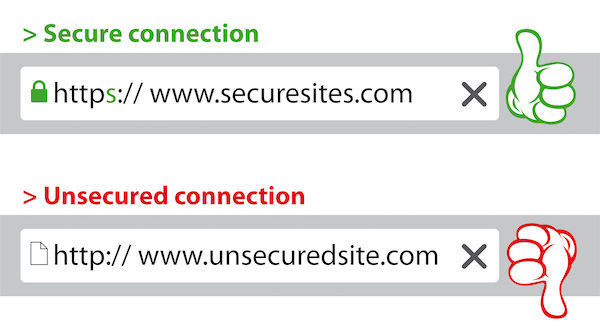Google Chrome Requires an SSL Certificate by July 1, 2018
With so much in news about internet security, hacking and malware, tech issues can seem overwhelming to the average business owner. But there is something fairly simple you can do right now to make your website safer for your customers. You can buy an SSL certificate. Here’s why:
Starting this July, Google will identify any site that does not provide an encrypted connection as ‘Not Secure’. Anyone visiting your website using a Google Chrome browser will see these words will prominently be displayed to the left of any non-SSL website domain. Basically, if your site address reads HTTP:// instead of HTTPS:// on July 1st, you will receive less Chrome traffic, because consumers will shy away from visiting your site. And since 60 percent of Internet users today use Google Chrome almost exclusively, this is the obvious reason to run out and buy yourself an SSL Certificate in the very near future.
What is an SSL Certificate?
This is a little technical, but bear with me. It’s pretty straightforward.
An SSL (Secure Socket Layer) is necessary to create an encrypted connection using TLS (Transport Layer Security Protocol) between your device and a website that you visit. Essentially it acts as a secure tunnel connection for your customers to your site. This encryption is what protects you from someone who might want to spy on your activity, steal data, or redirect you to a different website. This new browsing experience will act as a safety warning system for consumers. Thank you, Google!
How much does it cost and where do I get one?
Interestingly, as demand goes up, prices for SSL certificates have declined. Consumers have many options to purchase SSL certificates for their websites. Most hosting companies (the company that provides the space on their server for your website to live) offer SSLs, for an additional fee. However, some require that you upgrade your hosting package first. But premiere hosting companies, such as WP Engine, include a free SSL with all hosting plans.
This being said, it must also be made crystal clear, that an SSL will not protect your site, server, or network from being hacked, infected, or overtaken. Site owners must still take proper precautions by keeping their site code, software, and tools up-to-date, and by using best practices as a site administrator.
Just as Google is serious about protecting consumers, we’re serious about helping our clients keep their websites working well 24-7. That’s why What’s Your Avocado? offers Website Safety Reviews and Tutorials. We can also recommend a safer hosting environment and provide website maintenance services for your business.
After all, keeping your website safe and functional is one of the best marketing and advertising investments a business can make.

Rebecca Murray, DTM, brings her project management and client on-boarding skills to What’s Your Avocado?’s Creative Suite. She is also is a highly skilled videographer and excels at telling compelling stories through moving pictures and sound. She understands the success of a video depends not only on production but whether it reaches its intended audience to achieve its goal. A deep compassion for her subjects coupled with Rebecca’s professional expertise, combine to deliver affordably priced, high-quality video production and marketing services that help her share their unique message, promote key objectives, or sell more products. Rebecca is also an award-winning speaker who has participated at educational conferences throughout the Northwest Region.


0 Comments